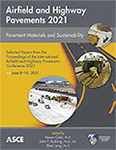Bitumen Stabilization of Base Layers for Pavement Rehabilitation Reaches Greater Heights
Publication: Airfield and Highway Pavements 2021
ABSTRACT
Cold recycling has globally lifted foamed bitumen and emulsion stabilization technology to unprecedented levels. From humble beginnings of five decades ago, where bitumen stabilization provided sustainable solutions for road rehabilitation under light to moderate traffic, cold recycling has evolved into a technology that addresses the demands of heavily trafficked highways with a high percentage of recycled asphalt. The key to the success of road recycling is reliable pavement performance evaluation (including durability) of recycled materials through the identification of the critical parameters, their tests defined by well-defined protocols, a reliable structural design function to estimate their service life as well as sound specification limits to measure against. This paper uses reclaimed asphalt pavement (RAP) as an increasingly important component of cold recycling to highlight the technological advances that have taken place in the last two decades. The development and standardization of mix and structural design processes for bitumen stabilized materials have enabled optimization and reliable application of the technology.
Get full access to this article
View all available purchase options and get full access to this chapter.
REFERENCES
Bierman, C. R., and Jenkins, K. J. (2019). A Design Function for Bitumen Stabilised Materials based on Laboratory and Field Evaluation. 8th European Asphalt Technology Association EATA Conference, Granada, Spain. pp. 1-12.
Collings, D. C., Jenkins, K. J., and Souza, E. (2015). Utilising Recycled Material Stabilised with Bitumen to Rehabilitate a Major Highway within Stringent Time Constraints. Conference on Asphalt Pavements for Southern Africa CAPSA 2015, Sun City, South Africa. ISBN 978-1-874968-69-6, pp. 1-12.
Collings, D. C., Hefer, A. W., Jenkins, K. J., and Johns, F. M. main authors. (2020). Technical Guideline TG2: Bitumen Stabilised Materials: A Guideline for the Design and Construction of Bitumen Emulsion and Foamed Bitumen Stabilised Materials. Third Edition. Published by Asphalt Academy via Sabita. KJJ input Chapters 1,2, 4 and 5 (total 35%). ISBN 978-1-874968-77-1. pp 221.
Dal Ben, M., and Jenkins, K. J. (2015). Durability properties of cold recycling material using bitumen stabilisation incorporating reclaimed asphalt pavement. Conference on Asphalt Pavements for Southern Africa CAPSA 2015, Sun City, South Africa. ISBN 978-1-874968-69-6, pp 1-21.
Ebels, L. J., and Jenkins, K. J. (2007). Characterisation of Bitumen Stabilised Granular Pavement Material Properties using Triaxial Testing. International Conference on Advanced Characterisation of Pavement and Soil Engineering Materials ICACPSEM, Athens, Greece, pp. 1-10.
Jenkins, K. J., Collings, D. C., Long, F. M., and Theyse, H. L. (main authors) with contributions from Jooste, F., Grobler, J., Hughes, M., and Thomson, H. (2002).Technical Guideline TG2: Bitumen Stabilised Materials: A Guideline for the Design and Construction of Bitumen Emulsion and Foamed Bitumen Stabilised Materials. Fisrt Edition. Published by Asphalt Academy, Cape Town, South Africa. pp. 1-131.
Jenkins, K. J., Collings, D. C., and Jooste, F. J. (2008). TG2: The Design and Use of Foamed Bitumen Treated Materials. Shortcomings and Imminent Revisions. Recycling and Stabilisation Conference, Auckland, New Zealand. pp. 1-16.
Jenkins, K. J., Collings, D. C., and Long, F. M. (main authors) with contributions from Jooste, F., Grobler, J., Hughes, M., and Thomson, H. (2009).Technical Guideline TG2: Bitumen Stabilised Materials: A Guideline for the Design and Construction of Bitumen Emulsion and Foamed Bitumen Stabilised Materials. Second Edition. Published by Asphalt Academy, Cape Town, South Africa. ISBN 978-0-7988-5582-2. pp. 1-136.
Jenkins, K. J. (2017). Performance of Bitumen Stabilised Materials BSMs – Laboratory Technology Developments and Implementation with LCC. World Conference on Pavement and Asset Management WCPAM, Baveno, Italy. pp. 1-10.
Jenkins, K. J., Collings, D. C., Johns, F. M., Hefer, A. W., and Greyling, A. W. (2019) TG2 (2020) removes barriers and elevates the performance of bitumen stabilised materials (BSMs), 12th Conference on Asphalt Pavements for southern Africa CAPSA 2019, Sun City, South Africa. ISBN 978-1-874968-78-8. pp 668-687.
Johns, F. M., and Hefer, A. W. (2019). Revision of the Pavement Number Design System DEMAC and Materials Classification System. Published by Rubicon Solutions. pp. 1-35. Johannesburg, South Africa.
Long, F. M., and Theyse, H. L. (2005). : The Engineering, Mechanical and Durability Properties of Crushed Hornfels Treated with Emulsified Bitumen and of Sand Treated with Emulsified Bitumen and Foamed Bitumen (Confidential). Prepared for Gauteng Provincial Government by CSIR. pp 1-265. Pretoria, South Africa.
Information & Authors
Information
Published In
Copyright
© 2021 American Society of Civil Engineers.
History
Published online: Jun 4, 2021
Authors
Metrics & Citations
Metrics
Citations
Download citation
If you have the appropriate software installed, you can download article citation data to the citation manager of your choice. Simply select your manager software from the list below and click Download.
